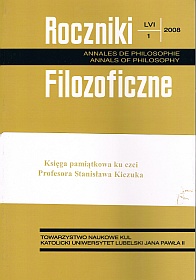Karola Wojtyły filozofia osoby ludzkiej jako podstawa obrony praw człowieka
Abstrakt
The teaching of John Paul II clearly articulates the strain of human rights. The Pope initiates a dialogue with the Enlightenment tradition and develops the theological and philosophical foundations of the culture of human rights. Karola Wojtyła’s personalistic thought appears to be a
very coherent and reliable key to understand the doctrine of human rights. Wojtyła stresses subjectivity and non-reducibility of the person as a concrete human „I.” It is both autonomy and transcendence that constitute dignity of the person towards other personal and impersonal beings.
Bibliografia
Friedman M.: Goods in Conflict?, [w:] G. Weigel (ed.), A New Wordely Order. John Paul II and Human Freedom, Washington, D.C.: Ethics and Public Policy Center 1992.
Jan Paweł II, Tryptyk rzymski, Kraków: Wydawnictwo św. Stanisława BM 2003.
Jan Paweł II, Pamięć i tożsamość, Kraków: Wydawnictwo Znak 2005.
Reale G.: Karol Wojtyła un pellegrino dell’Assoluto, Milano: Bompiani 2005.
Rosmini A.: The Philosophy of right, transl. by D. Claery, T. Watson, vol. II, Durham: Rosmini House 1993.
Św. Augustyn: Wyznania, tł. Z. Kubiak, Warszawa: Instytut Wydawniczy PAX 1978.
Wierzbicki A. M.: Antropologia Karola Wojtyły odczytana w jego poezji, „Ethos” 76 (2006), nr 4, s. 103-113.
Wojtyła K. / Jan Paweł II, Poezje, dramaty, szkice. Tryptyk rzymski, Kraków: Wydawnictwo Znak 2004.
Wojtyła K.: Osoba: podmiot i wspólnota, [w:] tenże, Osoba i czyn oraz inne studia antropologiczne, Lublin: TN KUL 1994, s. 385.
Wojtyła K.: Podmiotowość i „to, co nieredukowalne” w człowieku, [w:] tenże, Osoba i czyn oraz inne studia antropologiczne, Lublin: TN KUL 1994, s. 440-441. Po raz pierwszy artykuł ukazał się w języku angielskim: Subjectivity and the Irreducible in Man, „Analecta Husserliana” 7 (1978), s. 107-114.
Copyright (c) 2008 Roczniki Filozoficzne

Utwór dostępny jest na licencji Creative Commons Uznanie autorstwa – Użycie niekomercyjne – Bez utworów zależnych 4.0 Międzynarodowe.





